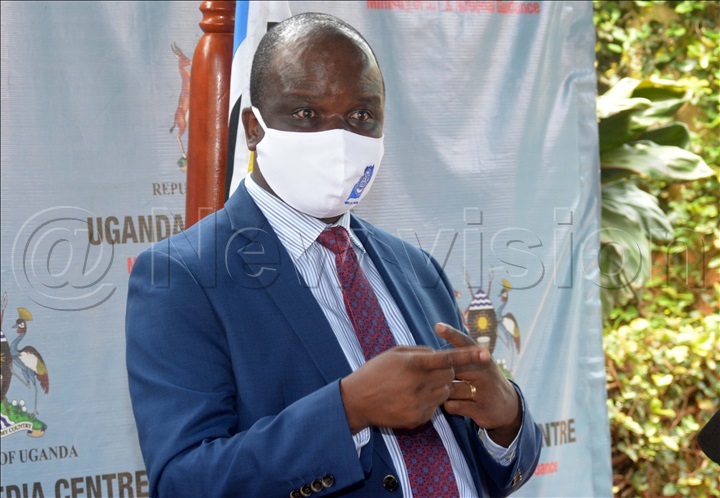Government to reactivate AIDS district, parish committees
Nov 27, 2020
“We must ensure that we reactivate these committees for effectiveness if we are to achieve zero HIV death by 2030,” he noted.

HIV/AIDS
Government is considering the reactivation of the AIDS committee structures at various levels, as part of the measures to end HIV/AIDS by 2030.
The board chairman Uganda AIDS Commission (UAC), Dr Eddie Mukooyo Sefuluya, explains that the committees are key in empowering the communities in the fight against HIV/AIDS.
"For this country to make improvements against the fight of HIV/AIDS, one of the key things we put in place were task forces. We had district, sub county and the parish committees. We normally empower the committees at the district level, who would then empower the sub county and parishes, who would then go to the communities," he said.
Sefuluya revealed this during a press briefing on the commemoration of the World AIDS day, at Uganda Media Centre in Kampala.
World AIDS day is commemorated annually on December 1st.
"We must ensure that we reactivate these committees for effectiveness if we are to achieve zero HIV death by 2030," he noted.
He stressed that Uganda with a 6% HIV prevalence, is a clear indication that all its approaches and programs are working and majority of the patients adhering to treatment.
"This means in every a hundred people, we have six people with HIV. Having this figure for many years, does not mean that we are stagnant. If we remain stagnant at six percent with this increased population, it shows a fundamental progress. At the population of 38 million it was 6%, but now our population is estimated to be over 43 million people and still at six percent," he explained.
He stressed that the stagnation means the population increment "you have had either was de-exposed to HIV/AIDS and you have been able to maintain your prevalence of six percent."
"In other awards it is a confirmation that the programs the government have put in place are functional and working and people have been receptive," he added.

However, Sefuluya stressed that the last mile is always the most difficult.
He said the fight must now be taken to community level at the individual person, to ensure that every person in a household know their HIV status.
"We want to ensure the community is able to support themselves and those that have HIV are directed for testing and be supported in a community structure. It is therefore imperative that as we move forward, prevention should be the main focus in addition to all other interventions," he added.
The Minister for Presidency, Esther Ambayo, said though Uganda has made a significant progress in fighting HIV over the last three decades, much still needs to be done to end the epidemic by 2030.
Uganda is ranked among the first 14 countries globally to have achieved the UNAIDS 2nd and 3rd targets (90% of all people living with HIV being put on treatment and 90% of those on treatment being viral suppressed).
She said this has positioned Uganda on track to achieve the ambitious goal of ending AIDS as a public health threat by 2030.
But Ambayo noted that in spite of the progress, the epidemic remains a major public health threat in the country.
According 2019 UNAIDS report, Uganda is estimated have 1.4 million people living with HIV, 53,000 new HIV infections registered annually and an estimated 21,000 Ugandans having died of AIDS related illnesses.
Ambayo called on all stakeholders to keep up the commitment towards preventing and ending HIV/AIDS through community mobilization engagement for social and behavior change.
She said due to the COVID-19 lockdown, this year's commemoration will be held scientifically in the compliance with the Ministry of Health SOPs at State House.
This year's celebration will be held under the theme: "National solidarity and shared responsibility towards ending AIDS".
She said UAC is working with cultural institutions to further mobilize communities in the fight against the epidemic.
The Director General UAC, Dr Nelson Musoba, said the COVID-19 lockdown affected the movement and many HIV patients failed or delayed to get medication on time.
"We are going to see the implication of this in the new report," he said.
Musoba noted that HIV prevalence remains higher in women compared to men ranging from 6.8% to 7.2% while men at 4.7%.
He said the prevalence rate among young people is also three times higher among the age of 15-25.
Musoba also noted that men between the age of 45-49 record the highest prevalence rate at 14% in men.
"These are men with money and always engage in transaction and cross generational sex with young women in the lower age group of 17 to 25 years," he noted.
The deputy head of healthy systems strengthening at the Infectious Diseases Institute, Dr Joanita Kigozi, said all structures aimed at ending HIV/AIDS are very important in the fight.
"There is always information fatigue and with time people forget. They always need to be reminded. I think the reactivation of these structures at various levels is very relevant. In fact we are already working with Kampala Capital City Authority (KCCA) to revitalize all these structures," she added.
Dr Patrick Ndase, an HIV prevention research expert, said any structural system that can be put in place to end the epidemic would essentially welcome.
